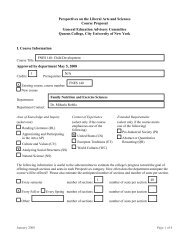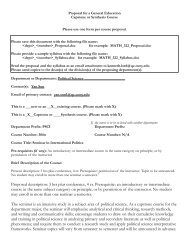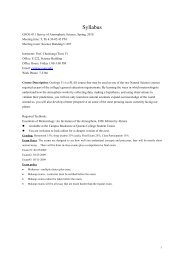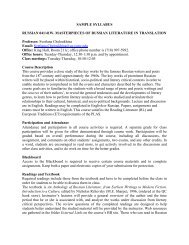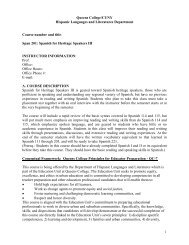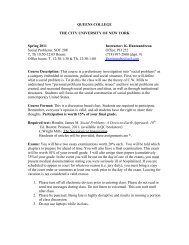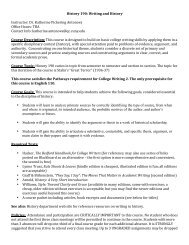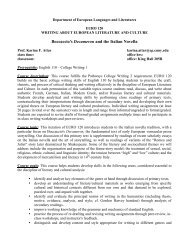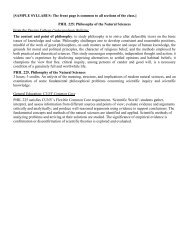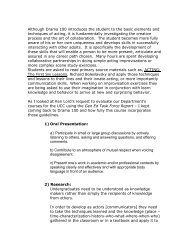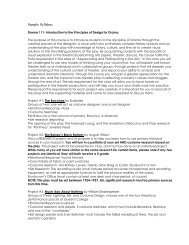Syllabus - Queens College Academic Senate - CUNY
Syllabus - Queens College Academic Senate - CUNY
Syllabus - Queens College Academic Senate - CUNY
Create successful ePaper yourself
Turn your PDF publications into a flip-book with our unique Google optimized e-Paper software.
<strong>Queens</strong> <strong>College</strong> / <strong>CUNY</strong><br />
Department of Comparative Literature<br />
Global Literatures I / CMLIT 101W<br />
VISIONS AND VERSIONS OF ANTIQUITY (PLAS COURSE)<br />
TTh 6:30 p.m. – 7:45 p.m. Instructor: Dr. Christopher Winks<br />
Kiely 412 Office: Kissena Hall 255<br />
Telephone: 718-997-5697<br />
E-Mail: christopher.winks@qc.cuny.edu<br />
Office Hours: T: 4:00 – 6:00 p.m.<br />
(or by appointment)<br />
COURSE DESCRIPTION<br />
What is termed the “ancient world” has conventionally been equated with “the Greeks and the<br />
Romans,” following an inaccurate Eurocentric paradigm that relegates the bulk of the globe to a<br />
“barbaric” periphery. This course proposes a broader focus that, while acknowledging the<br />
immense contributions of Greece and Rome, explores as well examples of the literatures of<br />
ancient Egypt, China, and India; medieval Persia and West Africa; and Mesoamerica after the<br />
Spanish Conquest (a tragic milestone in the forging of what we call the “modern” era). As we<br />
read and discuss these often fragmentary readings, we will consider not only their immediate<br />
historical and cultural contexts, but also their continuing resonance across time, place, and<br />
language.<br />
This is a writing-intensive course, which, simply put, means that you will be expected to do a lot<br />
of writing. Therefore, you should approach the required readings – none of which is particularly<br />
lengthy – not as books to be read through quickly for details of the “plot” (a term that in any case<br />
is inapplicable to many of the readings for this class) but as works emerging from specific<br />
cultural and historical contexts distant from our own and that therefore demand to be explored,<br />
puzzled over, and argued with (all of which you will be doing in your own written work as well<br />
as the discussions in class).<br />
IMPORTANT: This course is part of the Program in the Liberal Arts and Sciences<br />
(PLAS), and it satisfies the following Areas of Knowledge and Inquiry as described in the<br />
General Education Area Requirements: “Reading Literature” and “Culture and Values.”<br />
It also satisfies the Extended Requirement of “Pre-Industrial Society” and the “World<br />
Cultures” Context of Experience. As well as fulfilling the above-mentioned requirements,<br />
this course is a vital component of your liberal-arts education, inasmuch as it enables you,<br />
through reading and writing, to have a critical engagement with individual and social (not<br />
to mention religious) values that are at times, though not always, radically distinct from<br />
what tends to be accepted as the present-day norm. Since the intent of the course is to call<br />
attention to the multiplicity and diversity of pasts and civilizations that make up our
common global inheritance, it aims to give you a better understanding of your place in the<br />
modern world.<br />
REQUIRED TEXTS (photocopies to be distributed in class; books available from <strong>Queens</strong><br />
<strong>College</strong> Bookstore -- only the listed translations should be used)<br />
The Tale of Sinuhe and Other Ancient Egyptian Poems: 1940-1640 B.C. Ed. and trans.<br />
R.H. Parkinson. Oxford UP.<br />
Sappho. Trans. Mary Barnard. U. of California P.<br />
Herakleitos and Diogenes. From Seven Greeks, trans. Guy Davenport. Photocopies.<br />
Bhagavad-Gita: The Song of God. Trans. Swami Prabhavananda and Christopher<br />
Isherwood. Signet.<br />
Laozi. Dao De Jing: The Book of the Way. Trans. and commentary, Moss Roberts. U. of<br />
California P.<br />
Petronius. The Satyricon. Trans. William Arrowsmith. Meridian.<br />
Omar Khayyám, The Quatrains of Omar Khayyám: Three Translations of the Rubáiyát.<br />
Trans. Edward Fitzgerald, Justin McCarthy, Richard Le Gallienne.<br />
D.T. Niane. Sundiata: An Epic of Old Mali. Trans. G.D. Pickett. Longman.<br />
Miguel León-Portilla (ed. and intro.). The Broken Spears: The Aztec Account of the<br />
Conquest of Mexico. Trans. Lysander Kemp. Beacon.<br />
COURSE OBJECTIVES<br />
The purpose of this course is to develop your critical reading and writing skills so that you are<br />
able to discern common threads and convergences as well as divergences in a range of literary<br />
works drawn from a time span encompassing roughly 3,500 years. You should come away from<br />
this course with a heightened awareness of how literature matters, of its power to challenge and<br />
shape our knowledge of the world and its multiple pasts.<br />
COURSE REQUIREMENTS<br />
You must complete all assigned readings and be prepared to discuss them and write about them<br />
in class.<br />
Seven (7) assignments will be required from all course participants, as follows:<br />
1. Three (3) papers, two of which will be short interpretive essays (a maximum of 6<br />
typewritten double-spaced pages each), which will involve your own response to a<br />
choice of questions I will give you two weeks before the due date; and a third,<br />
longer (10-12 page) paper incorporating two outside critical sources. You will<br />
hand in a first draft of this second paper for my comments and suggestions, and<br />
then you will turn in a revised final version towards the end of the semester.<br />
2. Two (2) in-class writing assignments, also based on a choice of at least two<br />
questions handed out at the beginning of class.
3. A midterm exam covering the material up to that point.<br />
4. A final exam that will survey the entire semester’s readings, but will emphasize<br />
the work done in the second half of the semester.<br />
It is particularly important for you to be punctual and to attend class regularly, the more so as<br />
there will be no “make-ups” for the in-class work; these assignments must be done on the day<br />
indicated in the syllabus.<br />
You are expected to complete all of your assignments. Under only the direst personal<br />
circumstances will I accept late take-home papers. I have supplied the due date for assignments<br />
on the syllabus, so you should mark your calendars accordingly. Failure to turn in an assignment<br />
will have a negative effect on your final grade even if you do well on those assignments you do<br />
hand in. Any cases of plagiarism will be penalized with a failing grade.<br />
EVALUATION<br />
Your work in this class will be graded according to the A-B-C-D-F scale. I do not grant<br />
“Incomplete” grades (except in the event of a severe and verifiable medical and personal<br />
emergency), nor do I give “extra credit” assignments. You must satisfy all course requirements<br />
outlined in the previous section.<br />
Two short essays (6 pages maximum ea.) 30% of the grade<br />
Two in-class writing assignments 20% of the grade<br />
Midterm exam 15% of the grade<br />
Final research paper (10-12 pages) 20% of the grade<br />
Final exam 15% of the grade<br />
COURSE OUTLINE<br />
Week 1 (8/31) Introduction to course. Begin reading The Tale of Sinuhe and<br />
Other Ancient Egyptian Poems (21-102; 151-165; 246-272).<br />
Week 2 (9/5, 9/7) The Tale of Sinuhe, etc.<br />
Week 3 (9/12, 9/14) The Tale of Sinuhe, etc. FIRST IN-CLASS WRITING<br />
ASSIGNMENT 9/14.<br />
Week 4 (9/19, 9/21) Sappho, Poems and Fragments; Herakleitos and Diogenes<br />
(photocopies).<br />
Week 5 (9/26, 9/28) Sappho; Herakleitos and Diogenes. Begin reading the Bhagavad-<br />
Gita.
Week 6 (10/5) Bhagavad-Gita.<br />
Week 7 (10/10, 10/12) Bhagavad-Gita. FIRST SHORT ESSAY DUE, SECOND IN-<br />
CLASS WRITING ASSIGNMENT 10/12.<br />
Week 8 (10/17, 10/19) Laozi. Dao De Jing.<br />
Week 9 (10/24, 10/26) Dao De Jing. MIDTERM ON 10/26.<br />
Week 10 (10/31, 11/2) Petronius, The Satyricon.<br />
Week 11 (11/7, 11/9) The Satyricon. Begin reading Omar Khayyám, Quatrains.<br />
TOPICS FOR SECOND PAPER DUE 11/9.<br />
Week 12 (11/14, 11/16) Omar Khayyam, Quatrains (read Fitzgerald and McCarthy versions<br />
only). SECON D SHORT ESSAY DUE 11/16.<br />
Week 13 (11/21) D.T. Niane, Sundiata: An Epic of Old Mali.<br />
Week 14 (11/28, 11/30) Sundiata: An Epic of Old Mali. FIRST DRAFT OF RESEARCH<br />
PAPER DUE 11/28.<br />
Week 15 (12/5, 12/7) Miguel Leon-Portilla (ed.), The Broken Spears.<br />
Week 16 (12/12) The Broken Spears. FINAL DRAFT OF RESEARCH PAPER<br />
DUE.<br />
FINAL EXAMINATION TO BE HELD THE WEEK OF 12/18.



